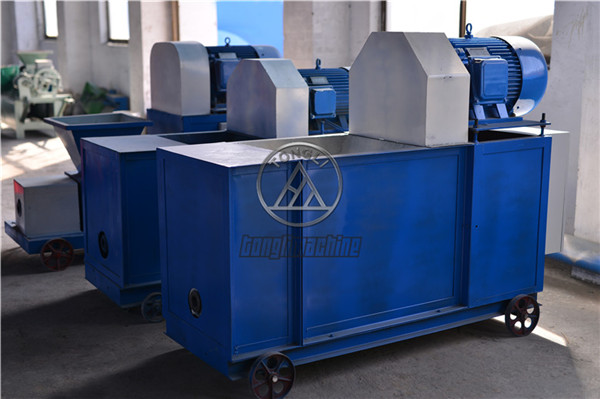Product List
Servers


Welcome to TONGLI Machinery
Characteristic of Sawdust Making Machine

1. The product has reasonable design, reliable manufacturing quality, simple structure, convenient operation, small size, less land occupation, labor saving and power saving characteristics.
2. The fully automatic control heating device designed can randomly adjust the dry and humidity of the material, ensure the stability of the discharge molding and improve the working efficiency.
3. The main parts of this product are made of wear-resistant materials, which are specially treated, so it can be continuously pressed and manufactured, and it is durable.
4. It is suitable for pressing various biomass raw materials, and has low energy consumption and high production efficiency.
5. the three bearings of the old-fashioned machine center are changed to four, which increases the stability and durability of the machine.
6. Change the old oil-coated lubrication to oil-immersed lubrication. As long as there is no shortage of oil, it can be used for many years.
7. Increase the pitch of the screw to increase the amount of feed, thus greatly increasing the output.
8. The structure of the forming cylinder was improved, the friction between the machine and the raw material was reduced, and the density of the mandrel was increased.
Method of making
The preparation of charcoal can be divided into four steps. 1. Crushing crushes raw materials into granules through a crusher. 2. Drying and then drying the particles through the dryer, avoid the mastery of moisture. 3. The rod-making machine makes the dried material into rods. 4. The final carbonization is through the carbonization of the carbonization furnace and the finished charcoal is cooled.
Purpose
Today, the State Council expressly stipulates that wood is not allowed to burn charcoal. It is a kind of waste renewable energy fuel. Its calorific value is higher than that of charcoal with similar raw materials. It is smokeless, tasteless, non-toxic, clean and hygienic. It can be widely used for household heating. There is a great demand for barbecue food in the international market. It can replace coal or heavy oil-fired steam boilers in industry, and can also be used as chemical raw materials for deep processing of activated carbon and silicon carbide. Crystalline silicon, etc. It is a necessary raw material for carbon disulfide factory, mosquito incense factory, explosive factory, copper processing factory and foundry factory.
Industrial uses
1. Used for smelting high quality non-ferrous metals and cast iron.
2. As a carburizing agent for mechanical parts, it can improve the hardness and wear resistance of the surface of steel parts.
3. Propellants are prepared with potassium nitrate and sulphur.
4. Graphite can be made. As a solid lubricant, it is very important for rotating parts that cannot use lubricating oil (graphite as sliding bearing). As graphite electrode.
5. Activated carbon has been widely used in chemical industry, medicine and environmental protection. For example, it can be used to purify chemicals, purify drinking water and air harmful substances, and make gas masks.
6. The iodine content of charcoal made from corn stalk and rice stalk fuel rod is 500 mg/g close to that of industrial activated carbon. It can be used to control pollution and reduce cost greatly.
Agricultural uses
1. Raising the Earth's Temperature
The application of charcoal powder in soil can increase soil temperature by several degrees Celsius and promote seed germination due to the absorption of solar heat energy by black charcoal particles. Especially, it can promote the germination of seeds which are not easy to germinate and improve the germination rate.
2. Soil Improvement
After applying charcoal powder in the soil, rhizosphere bacteria can be formed on the surface of charcoal, thus forming an agricultural soil suitable for plant cultivation, avoiding the so-called "continuous farming obstacles"; and charcoal can improve the growth, color and taste of grains, beans and vegetables.
3. Maintaining Soil Moisture
When the relative humidity of charcoal is above 50%, it can quickly absorb about 20% of water, which can be used to maintain soil moisture. At the same time, it can improve the permeability and drainage of soil, and provide a good living space for microorganisms beneficial to plants.
4. Sustained Release Agents of Pesticides or Fertilizers
Utilizing charcoal's adsorptive capacity, the content of pesticides and organic fertilizers can be kept in a balanced state. Using this balance, pesticides or fertilizers can be released slowly for a considerable period of time, and it is not easy to run off with rainwater.
Animal husbandry use
1. Charcoal has the function of adsorbing odor. It can be used to fill livestock shed, deodorize, improve livestock and poultry living environment, and promote the growth of livestock and poultry.
2. Charcoal can also enhance the digestibility of livestock and poultry. Adding a small amount of charcoal powder to feed can accelerate the growth and development of livestock and poultry, and improve the quality of meat and milk.
3. 90 grams of charcoal powder, 60 grams of stir-fried salt and 30 grams of licorice were used to treat gastrointestinal catarrh of livestock.
4. Diarrhea caused by indigestion or unclean drinking water can be fed with 3% charcoal powder in the diet. It can be used with other drugs to treat paralysis of livestock and poultry, cartilage disease, yellow and white dysentery, bacterial dysentery, diarrhea, castration bleeding, lamb dysentery and other diseases.
Life use
1. People often use charcoal for heating, barbecuing and shampoo. Because of its smokeless smell, high calorific value and long burning time, it is more and more popular.
2. There are numerous holes in charcoal, which have the function of adsorbing various substances and releasing adsorbing substances. Therefore, people use them as dehumidifiers. When it is wet, charcoal absorbs moisture, and when it is dry, it releases the absorbed moisture, thus playing an excellent role in regulating humidity. In addition, charcoal can also eliminate odors and harmful substances in the room.
3. The porosity of charcoal can not only retain the water needed by plant roots, but also improve the permeability and drainage of soil, and provide a good living space for microorganisms beneficial to plants. Therefore, adding 5-10% charcoal in potted soil of flowers and trees can provide a healthy growth environment for plants; while garden trees can enhance their resistance to diseases and pests.
4. Nowadays, the concept of decoration has begun to pay attention to the characteristics of environmental protection, nature, health and humanity. Decorative charcoal, the use of small pore space, a handful of soil will grow a lush bonsai.
 Email:
Email: 
